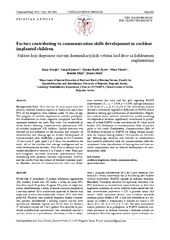Приказ основних података о документу
Factors contributing to communication skills development in cochlear implanted children
Faktori koji doprinose razvoju komunikacijskih veština kod dece sa kohlearnim implantatima
| dc.creator | Ostojić, Sanja | |
| dc.creator | Đoković, Sanja | |
| dc.creator | Radić-Šestić, Marina | |
| dc.creator | Nikolić, Mina | |
| dc.creator | Mikić, Branka | |
| dc.creator | Mirić, Danica | |
| dc.date.accessioned | 2021-06-09T14:07:55Z | |
| dc.date.available | 2021-06-09T14:07:55Z | |
| dc.date.issued | 2015 | |
| dc.identifier.issn | 0042-8450 | |
| dc.identifier.uri | http://rfasper.fasper.bg.ac.rs/handle/123456789/895 | |
| dc.description.abstract | Background/Aim. Over the last 10 years more than 300 persons received cochlear implant in Serbia and more than 90% of the recipients were children under 10 years of age. The program of cochlear implantation includes postoperative rehabilitation in which cognitive, integrative and developmental methods are used. The study was conducted to reveal factors affecting communication performance (CP) of cochlear implanted (CI) children. Special attention was focused on the influence of the duration and intensity of rehabilitation and hearing age on further development of communication skills. Methods. A group of 30 CI children (13 boys and 17 girls) aged 2 to 5 years was enrolled in the study. All of the children had average intelligence and no other developmental disorder. They lived in families and attended rehabilitative seances 3 to 5 times a week. Their parents/caregivers answered structured questionnaire about functioning after pediatric cochlear implantation (FAPCI) and the results were the subject of detailed statistical analysis. Results. Analysis of variance did not show any difference between the boys and the girls regarding FAPCI achievements (F (1, 28) = 2.909; p = 0.099) and age aberration in CP score (F (1, 28) = 0.114, p = 0.738). Correlation analysis showed a statistically significant difference in FAPCI scores related to hearing age and duration of rehabilitation. Regression analysis (enter method) showed that model consisting of indipendent variables significantly contributed to prediction of overall FAPCI scores and Adjusted R2 value could explain 32% difference in communication skills of participants in this study. Conclusion. Communication skills of CI children evaluated by FAPCI are falling behind normatives for normal hearing children 18.6 months on the aver-age. Hearing age, duration and intensity of rehabilitation have positive predictive value for communication skills development. Later identification of hearing loss and later cochlear implantation lead to delayed development of communication skills. | en |
| dc.description.abstract | Uvod/cilj. U poslednjih 10 godina, kohlearna implantacija (KI) urađena je kod oko 300 osoba u Srbiji, od kojih 90% čine deca ispod 10 godina. Program KI praćen je odgovarajućom rehabilitacijom u kojoj se koristi saznajni, integrativni i razvojni metod. Ovo istraživanje ispitivalo je faktore koji doprinose razvoju komunikacijske veštine (KV) kod dece posle KI. Posebno smo ispitivali doprinos dužine i intenziteta procesa rehabilitacije i slušnog uzrasta razvoju ovih sposobnosti. Metode. Ispitali smo 30 KI dece (13 dečaka i 17 devojčica) uzrasta od 2 do 5 godina. Sva deca bila su prosečnih intelektualnih sposobnosti, bez udruženih smetnji u razvoju, živela su u porodičnom okruženju, a bila su uključena u program rehabilitacije od 2 do 5 puta nedeljno. Instrument u ovom istraživanju bio je Functioning after Pediatric Cochlear Implantation (FAPCI) upitnik za roditelje/staratelje. Rezultati. Poređenje rezultata KI ispitanika dobijenih FA-PCI upitnikom sa normativima uspostavljenim za decu bez implantata pokazuju da razvoj njihovih komunikativnih veština (communication performance - CP) u proseku kasni 18,6 meseci. Među ispitanom decom nisu utvrđene statistički značajne polne razlike u CP, a one nisu zabeležene ni s obzirom na razliku u aberacijama u odnosu na uzrast u CP skoru (F(1, 28) = 0.114; p = 0.738). Rezultati korelacione analize pokazuju da je postignuće na FAPCI statistički zna-čajno povezano sa slušnim uzrastom i dužinom trajanja re-habilitacije. Rezultati regresione analize stepwise izdvajaju slušni uzrast kao jedini značajan prediktor ukupnog skora na FAPCI upitniku, a vrednost prilagođenog R2 pokazuje da se njime objašnjava oko 32% razlika u komunikacijskim vešti-nama ispitanika. Zaključak. Slušni uzrast, trajanje i intenzitet rehabilitacije pozitivno doprinose razvoju komunikativnih veština kod KI dece, dok kašnjenje u uspostavljanju dijagnoze i sprovođenju KI ometa ovaj aspekt razvoja. | sr |
| dc.publisher | Vojnomedicinska akademija - Institut za naučne informacije, Beograd | |
| dc.relation | info:eu-repo/grantAgreement/MESTD/Basic Research (BR or ON)/179055/RS// | |
| dc.rights | openAccess | |
| dc.rights.uri | https://creativecommons.org/licenses/by-sa/4.0/ | |
| dc.source | Vojnosanitetski pregled | |
| dc.subject | cochlear implants | en |
| dc.subject | child | en |
| dc.subject | communication | en |
| dc.subject | questionnaires | en |
| dc.subject | kohlea | sr |
| dc.subject | implantat | sr |
| dc.subject | deca | sr |
| dc.subject | komunikacija | sr |
| dc.subject | upitnici | sr |
| dc.title | Factors contributing to communication skills development in cochlear implanted children | en |
| dc.title | Faktori koji doprinose razvoju komunikacijskih veština kod dece sa kohlearnim implantatima | sr |
| dc.type | article | |
| dc.rights.license | BY-SA | |
| dc.citation.epage | 688 | |
| dc.citation.issue | 8 | |
| dc.citation.other | 72(8): 683-688 | |
| dc.citation.rank | M23 | |
| dc.citation.spage | 683 | |
| dc.citation.volume | 72 | |
| dc.identifier.doi | 10.2298/vsp140221057O | |
| dc.identifier.fulltext | http://rfasper.fasper.bg.ac.rs/bitstream/id/773/892.pdf | |
| dc.identifier.scopus | 2-s2.0-84938309412 | |
| dc.identifier.wos | 000361082500004 | |
| dc.type.version | publishedVersion |


